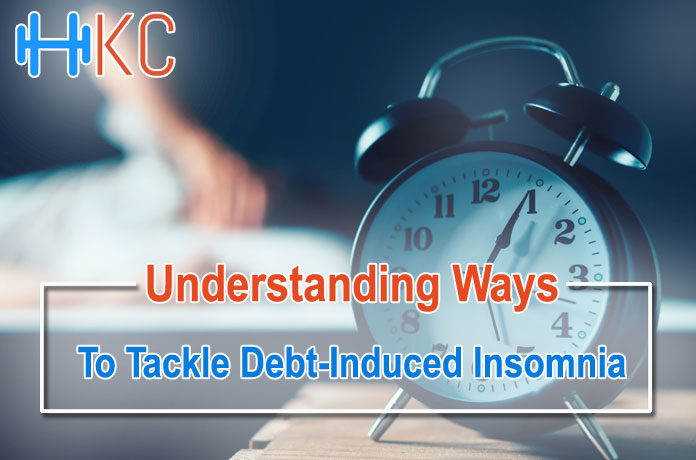Understanding Ways to Tackle Debt-Induced Insomnia
Many of you are unable to sleep at night and are often flooded with debt worries the moment you hit the bed. If it gives you some consolation, understand that you are not alone. Americans are grappling with huge consumer debts. The overpowering debts are triggering many health issues, insomnia being one such health condition that needs to be taken seriously as it may culminate in some undesirable consequences.
As per, www.forbes.com, “According to the American Psychological Association (APA), money continues to be the top cause of stress among Americans. In its 2015 survey, Stress in America: Paying with Our Health, the APA found that 72 percent of Americans reported feeling stressed about money at least, some of the time during the prior month.” We know that for the majority of the Americans (64% of the total population), debts and money issues seem to be a major source of perpetual stress. 77% of the parents in the United States were quite stressed out because of anxiety over money issues such as ever-mounting debts. As such, numerous people are developing sleep issues especially, insomnia.
You need to understand the precise reason why you are perpetually worried and stressed about money matters. Often insurmountable debts and your inability to repay them could be the root cause of your shooting stress levels and sleep issues such as insomnia. If you are worried about overwhelming debts, you could chalk out a strategic debt repayment plan, stick to the budget firmly, try to boost your savings and reduce your expenses.
What Is Insomnia?
Insomnia is supposed to be sleep disorder which is characterized by inability or difficulty to fall asleep or for that matter, even stay asleep. Insomnia may be triggered by several factors with money matters and debt-associated stress being some of the chief causes of insomnia, People suffering from insomnia may demonstrate one or multiple of the symptoms discussed below:
- Difficulty to fall asleep at night.
- Sleepiness all through the day.
- Irritability.
- General tiredness.
- Memory & concentration issues.
Effective Tips to Avoid Debt-Induced Insomnia
If you are facing a lot of stress, anxiety, and worries associated with debt issues, you are at risk of developing insomnia and other sleep-associated disorders. Whenever you are hitting the bed at night, you keep worrying about money and debts, your mind is restless and the racing thoughts keep you from sleeping peacefully at night. Here are a few preventive measures to take to avoid debt-induced insomnia and other sleep disorders.
- Get into the habit of going to bed every night at precisely the same time and get up in the morning at the very same time daily. This would be including the weekends. You need to stick strictly to a schedule so that you could be remarkably more alert as compared to you slept at varying hours throughout the week but for an equal amount of time.
- You must consider sleeping in specifically, a single continuous block. You need to remember that fragmented sleep would trigger daytime drowsiness, and severely compromise your creativity, productivity, memory, and learning. If you wish to avoid debt-induced insomnia, it is best to sleep continuously for six hours for a more rejuvenating and restorative experience as opposed to almost 8 hours of what is referred to as the ‘fragmented sleep’.
- Avoid consuming alcoholic drinks at least, three hours before bedtime. Even though alcohol may assist you in falling asleep, it would cause erratic sleep as you would be waking up every 90 minutes or so.
- You need to sleep in a cool and comfortable bedroom. You would experience nightmares in a warm bedroom. If it is pretty cool, your body would not be getting the right amount of rest as it is busy trying to safeguard its core temperature.
- You must consider devoting some time to reading. You could read works of fiction for 30 minutes or so to reduce the time needed to fall asleep.
- Avoid caffeine a few hours before bedtime.
How to Tackle Your Debts with a Firm Hand to Avoid Insomnia
Get to Know the Reality
You must consider taking an inventory. Stress is actually born because of the fear of the unknown. You need to get familiar with all your money issues, debts, and overall financial state. Keep tracking your expenses and earnings. Examine the balance sheet and understand precisely the amount you actually have. You need to understand clearly where your earnings actually go every month. This is the best way of getting grounded with reality. By being mindful and fully-aware, you could help in alleviating your debt issues, hence, no stress or insomnia. Browse through renowned sites such as Nationaldebtreliefprograms.com for seeking perfect debt solutions promptly.
Consider Automating Your Finances
You could come up with a plan for automatically paying down your debt by a specific amount every month. Or you may consider automating a precise amount that would be diverted into savings automatically once every week. Whether you are following a plan of paying down your debts or saving every month, you may set up automatic transfers that could help in keeping the plan on the right track. This could alleviate the acute mental stress that sparks insomnia.
Follow a Budget
Once you chalk out a budget and stick to it religiously, you do not require checking compulsively your precise bank account balance. Budgeting is generally related to not splurging money. It does give you some freedom to indulge in spending but within limits. Once you know precisely where is money actually going to, you could successfully regain control and exercise firm grip over your finances and debt situation.
Create an Emergency Fund
Unexpected expenses could upturn your entire life if you do not have a contingency plan to deal with them. A big medical bill or a huge repair cost would be a serious issue if it appeared out of nowhere. You need to have a cushion for a rainy day, and experts suggest this should be worth at least, three to six months of wages or at least living expenses. This needs to be maintained in a separate account and not your savings account for two reasons: the first being this kind of account could earn more interest and the second being that you won’t be tempted to dip in whenever a new item catches your fancy.
Conclusion
Your debts and money matters could keep you awake all night and trigger insomnia or other sleep disorders. However, if you are alert, careful, and if you take proactive steps discussed above you could keep both debts and insomnia at bay.

























